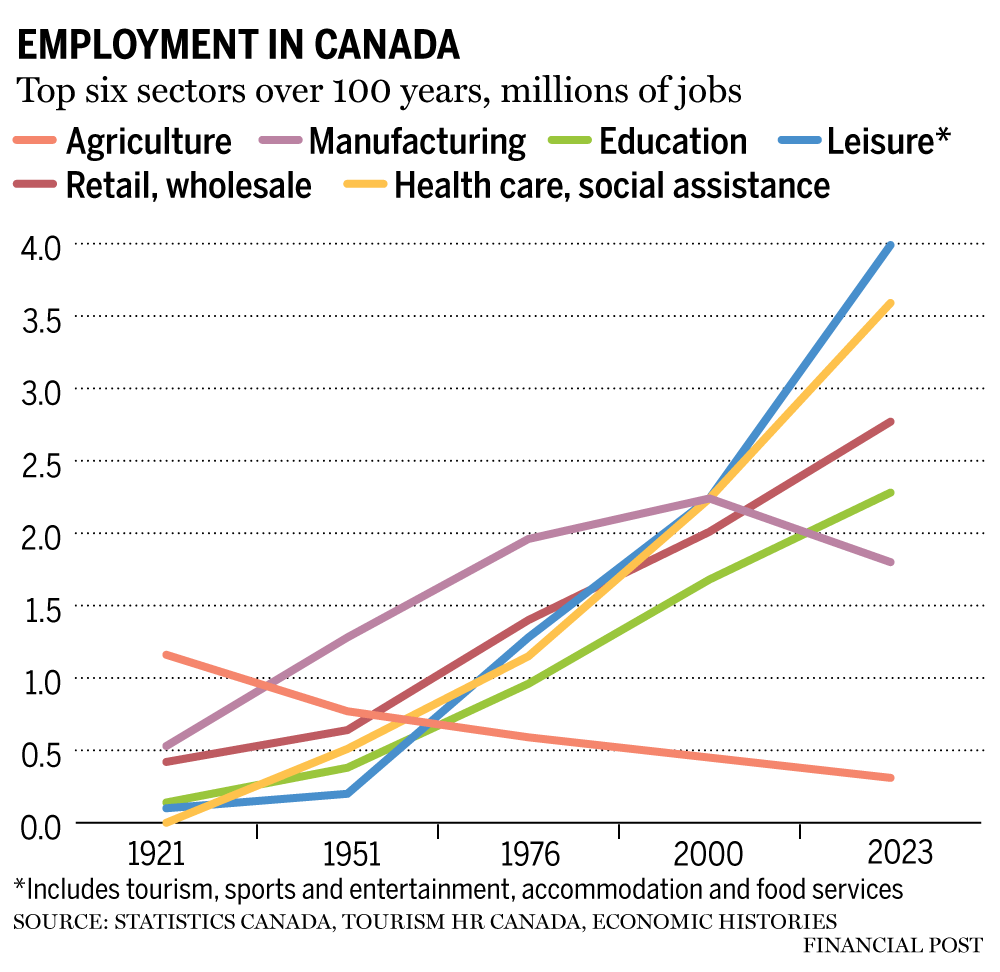Tobi Lütke
, the founder of Ottawa-based
Shopify Inc.
, has a new mantra for his workforce: “AI first.”
In a recent memo, the CEO urged staff to seek
artificial intelligence
solutions before requesting additional resources or new hires, a directive that’s rippling through Canada’s tech sector. Lütke has emphasized that AI is not about cutting jobs, but about reimagining work.
For many, the message is clear: AI is reshaping the workplace, and for the worse. The World Economic Forum’s Future of Jobs Report 2025, released in January, paints a stark picture. By 2030, AI and automation are expected to displace 92 million jobs globally, from coders to customer service reps.
In Canada, where tech and manufacturing employ more than 1.5 million people, the impact could be profound. Micha Kaufman, chief executive of freelancing platform Fiverr International Ltd., didn’t mince words in a recent e-mail to his employees that he shared on X: “AI is coming for your jobs. Heck, it’s coming for my job too.”
But in this upheaval lies an unexpected opportunity, one that’s already transforming industries and redefining how we live.
The fear of an AI-driven dystopia —
mass layoffs
, strained social safety nets — dominates headlines. Yet history suggests economies adapt to technological shocks.
For example, the Industrial Revolution displaced weavers, but birthed factory jobs. The internet killed travel agencies, but spawned digital marketing.
E-commerce
displaced a million retail jobs between 2000 and 2020, only to replace them with distribution centre and parcel delivery jobs.
AI’s pace may be faster, but the World Economic Forum report offers hope: 92 million jobs may vanish, but 170 million new ones could emerge, yielding a net gain of 78 million.
In Canada, roles in tech, health care and education are projected to grow, but the real wild card is leisure.

As AI automates routine tasks, it’s not just threatening jobs; it’s unlocking a leisure revolution. From pickleball courts to brand-new sports leagues reimagining the audience experience, the global leisure sector is poised for a boom, and Canadian businesses must capitalize on it.
As AI boosts
productivity
, companies are rethinking work itself. Shopify’s “AI first” policy is one example. With just a 20 per cent productivity gain, companies may be able to consider a shorter workweek, something that is already gaining traction in Denmark. More free time creates more opportunity to spend time and money on leisure activities.
This shift is already visible, although driven by baby boomers having more time to pursue leisure activities, but it offers a blueprint for a world where workers have more free time.
Globally, the leisure sector — spanning sports, travel and accommodation, and entertainment — is receiving unprecedented investment. In Canada, where tourism contributes almost $40 billion annually to the gross domestic product, the implications are massive.
The global sports industry, valued at US$600 billion, is growing at five per cent annually, and new leagues are driving the surge. The Professional Women’s Hockey League, launched in 2023, draws 10,000 fans per game. The Saudi-backed LIV Golf is shaking up the sport with US$25-million purses, while cricket’s India Premier League, valued at US$10.7 billion, has inspired franchise models worldwide.
Tiger Woods’ tech-driven TGL league, launched this year, promises interactive golf for digital audiences. Esports tournaments, such as Toronto’s Overwatch events, pack arenas and stream to millions. Formula One’s U.S. expansion, with races in Miami and Las Vegas, boosts Montreal’s Canadian Grand Prix, which drew 350,000 attendees in 2024. Major League Soccer, meanwhile, has surged since Lionel Messi joined Inter Miami FC, with TV ratings up 20 per cent in North America.
These leagues demand infrastructure — stadiums, smart technology, advanced cameras, fast networks, streaming platforms, food and beverage sales and training facilities — and, of course, labour.
AI-displaced workers, from call centre staff to accountants, will discover new roles as coaches, broadcasters, technologists and event planners. The owner of the Toronto Maple Leafs is investing $350 million in its Scotiabank Arena revitalization project.
Private equity is also circling: the NFL’s recent move to allow 10 per cent team ownership by funds signals where smart money is headed. The sports boom needs people, not bots.
If sports are thriving, travel is soaring. Global air passenger numbers have expanded at a 4.5 per cent compound annual growth rate over the past decade, fuelled by rising incomes and retiring baby boomers.
Globally, the International Air Transport Association reported a 12.8 per cent jump in international traffic in 2024. Cruises are even hotter: the global fleet grew 24.2 per cent from 2015 to 2025, with 323 ships now sailing. Vancouver’s port, a cruise hub, welcomed 1.3 million passengers in 2024, up 15 per cent from pre-COVID-19 levels.
The cruise industry supports 1.6 million jobs globally, 77 per cent of them land-based, from hospitality to logistics. Ports such as Halifax and Victoria are hiring for roles AI can’t touch, such as tour guides, event planners and wellness coaches.
Entertainment is also reinventing itself. Netflix and YouTube are creating jobs for Canadian content creators, from Vancouver animators to Toronto podcasters. As AI displaces desk jobs, roles in hospitality, stage production and influencer marketing are multiplying.
Canada’s leisure sector isn’t just riding a global wave; it’s carving its own path. The country’s vast landscapes, from Banff, Alta., to the Maritimes, are a draw for road trippers, especially as self-driving tech makes travel exciting again. Health and wellness retreats around the world, such as Quebec’s Le Monastère des Augustines, are booming as people seek balance in an AI-driven world.
Challenges remain.
Labour shortages
, a perennial issue in tourism, could intensify as demand grows. But a rebalancing opportunity exists and younger workers are more likely to be self-motivated to upskill into the business of leisure given the attractiveness of this sector to this demographic.
AI could deliver what past innovations promised: a life enriched by time, not defined by toil. That means more weekends on the slopes, more evenings at the rink and more summers exploring the world.
Deepak Chopra is a corporate director and adviser to Founders.
Bookmark our website and support our journalism: Don’t miss the business news you need to know — add financialpost.com to your bookmarks and sign up for our newsletters here.
Opinion: Canada needs to start building out the leisure industry as AI takes hold
2025-06-04 10:00:10





